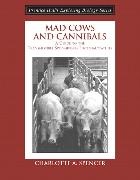Ulteriori informazioni
Mad Cows and Cannibals guides the reader through the complex world of transmissible spongiform encephalopathies (TSEs) - bizarre, degenerative brain diseases that afflict both animals and humans.The journey leads us from ritualistic cannibalism in the highlands of New Guinea. throuch the modern agricultural feeding practices that triggered the Mad Cow Disease epidemic in Great Britain, to the recent outbreak of chronic wasting disease in North America. In clear and accessible language, Mad Cows and Cannibals explains the biology of TSEs and explores how political and social actions can contribute to their spread. It also answers questions about how TSEs affect the safety of our food supply, blood supply, and medical procedures. A comprehensive list of web and print resources points the way for continued exploration of this important and controversial topic.
Sommario
Introduction.
The Biology of Transmissible Spongiform Encephalopathies.
What Are TSEs? The Human TSEs. What Causes TSEs? How Can Infectious Proteins Cause Disease? The Prion Hypothesis. Evidence to Support the Protein-Only Prion Hypothesis. Other Important Features of TSEs and Prions.
Questions About TSEs and Their Transmission.
How Do Prions Get Into the Brain? Do Surgical and Dental Instruments Spread TSEs? Can TSEs Be Spread Through Blood Transfusions or Blood Products? What About Organ Transplants? Are Vaccines Safe? Are There Diagnostic Tests for TSEs? Are There Any Treatments for TSEs?
Questions About Mad Cow Disease and nvCJD.
Why Did BSE Suddenly Appear in British Cattle in the 1980s and Why Did It Become an Epidemic? Why Is BSE Still Present in British Cattle? Which Countries Have BSE-Infected Cattle and How Did the Disease Get There? Is It Safe to Eat Beef in the UK and Europe? How Many People Have Died from nvCJD and How Many Will Develop the Disease? Do Mad Cow Disease or nvCJD Occur in North America?
Questions About Chronic Wasting Disease: The North American Mad Cow Disease?
What Is CWD? Where Did CWD Come From? How is CWD Related to BSE and nvCJD? How Is CWD Spread from Animal to Animal? Can Humans Get CWD? Is There an Epidemic of CWD and If So, How Can It Be Stopped?
TSE Perspectives.
How Stringent Should We Make Government Regulations When the Risks of Transmitting a TSE Are Unknown? Should Recipients of a Potentially TSE-Tainted Blood Transfusion or Surgical Procedure Be Informed, When the Risks Are Low to Unknown, and the Disease Is Incurable? Could Prions of an Entirely New TSE Enter Our Food Supply, Causing Disease in Humans?
References and Resources.
Riassunto
Part of the Prentice Hall Exploring Biology Series, Mad Cows and Cannibals explores the biological, political and social aspects of transmissible spongiform encephalopathies, including Mad Cow Disease and Chronic Wasting Disease.
The text begins with stories of ritualistic cannibalism in the highlands of New Guinea, and leads to the modern agricultural feeding practices that triggered the Mad Cow Disease epidemic in Great Britain, and to recent outbreaks of Chronic Wasting Disease in North America. In clear and accessible language, it explains the biology of these bizzare, degenerative brain diseases, answering important questions about how TSEs affect the safety of our food supply, blood supply, and medical procedures.

